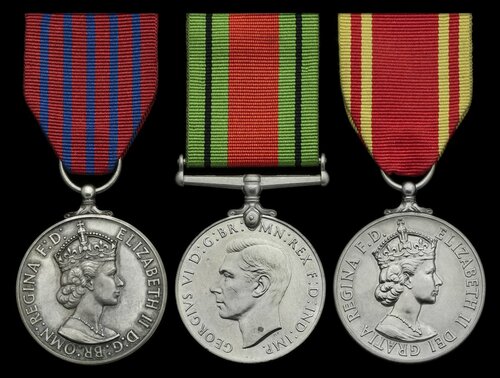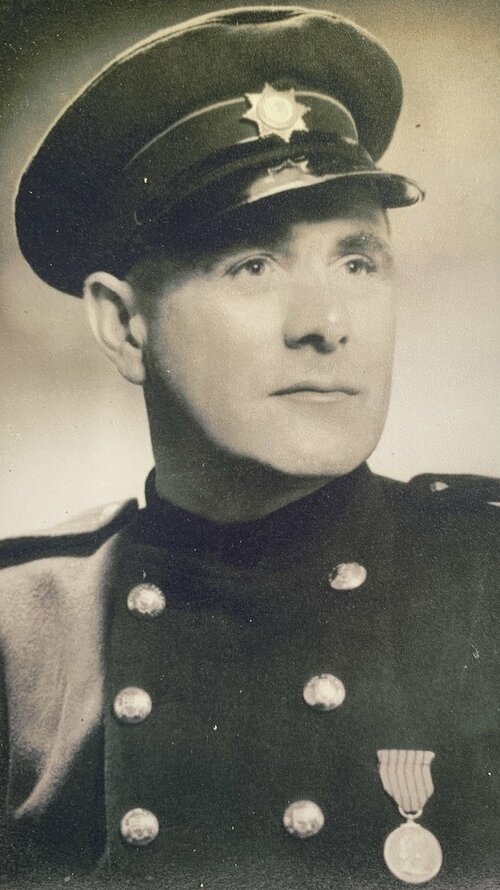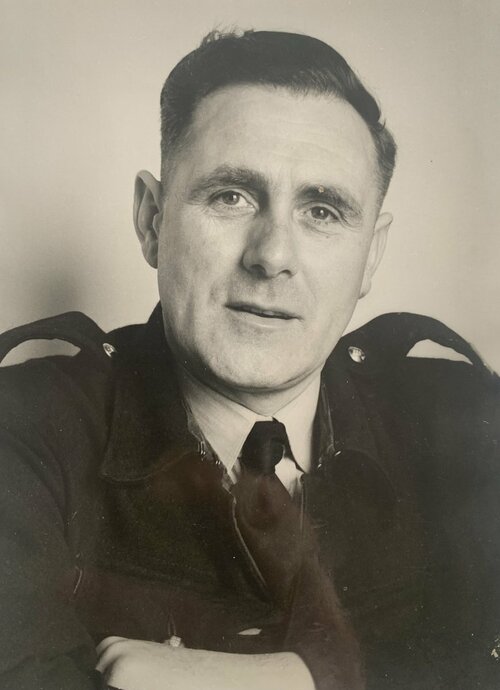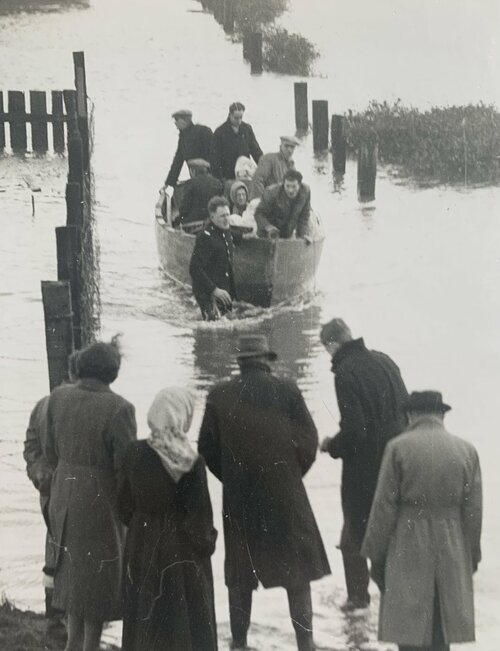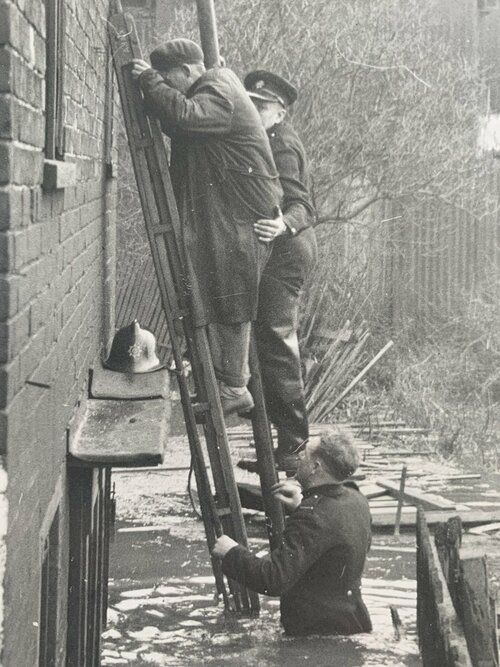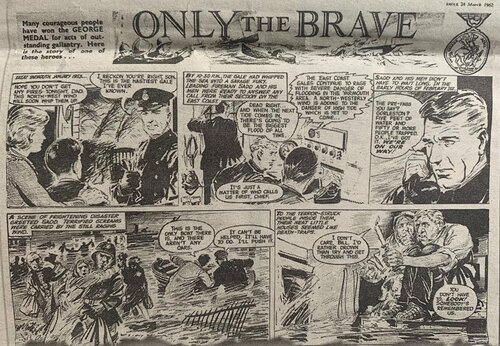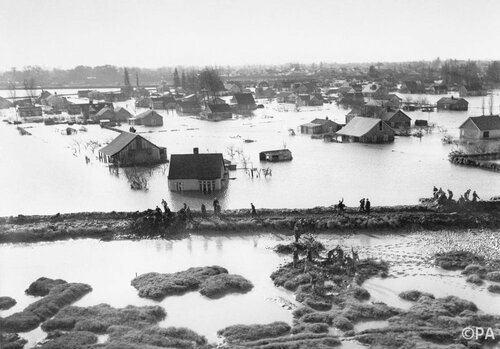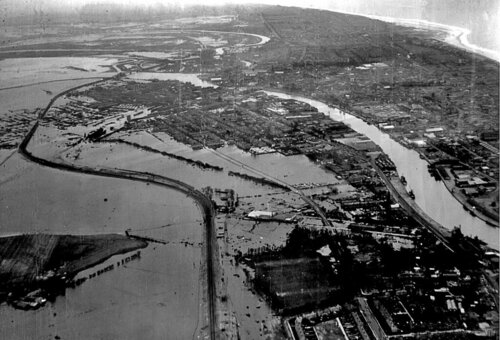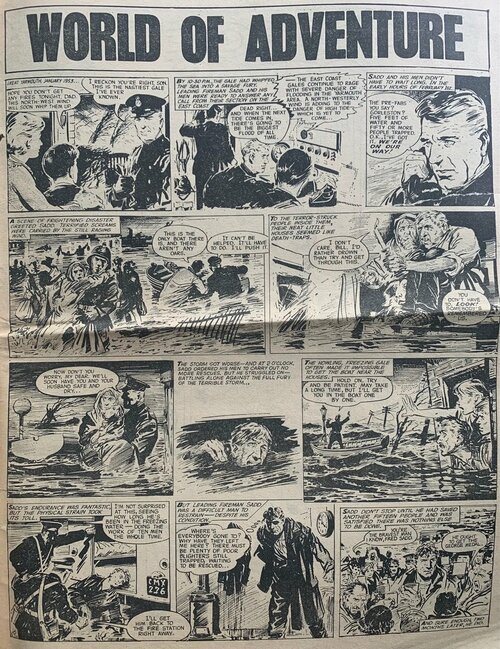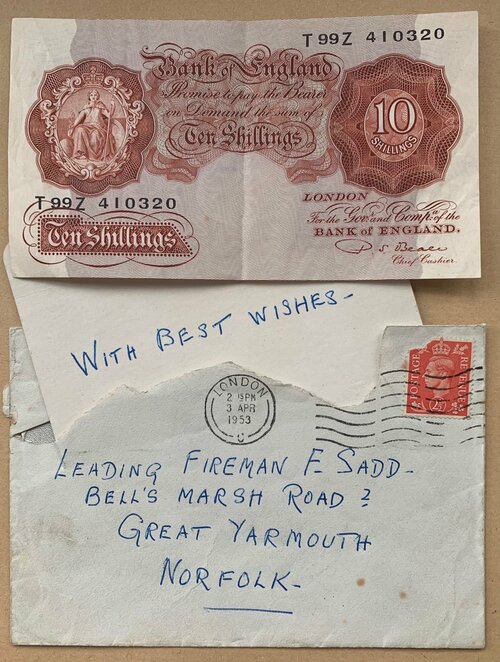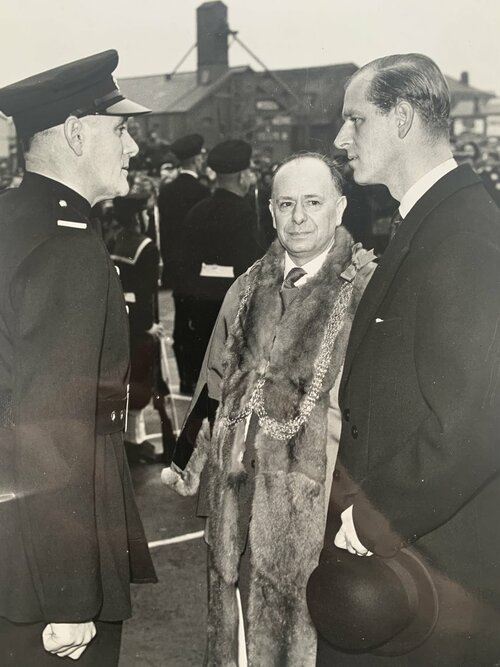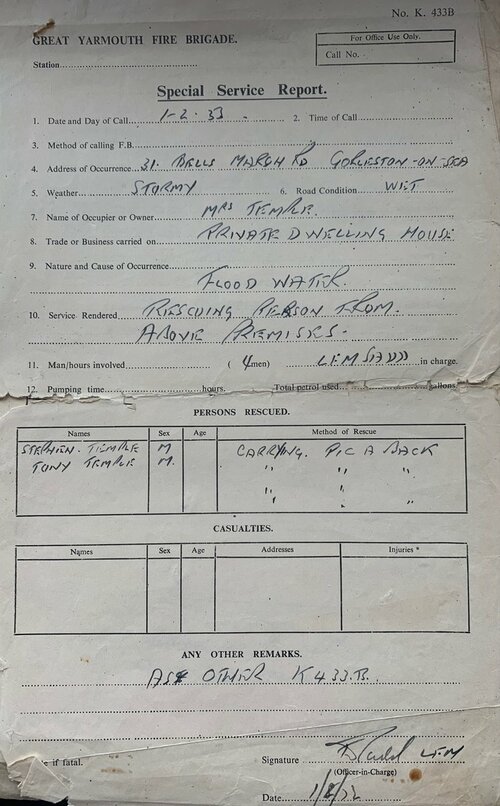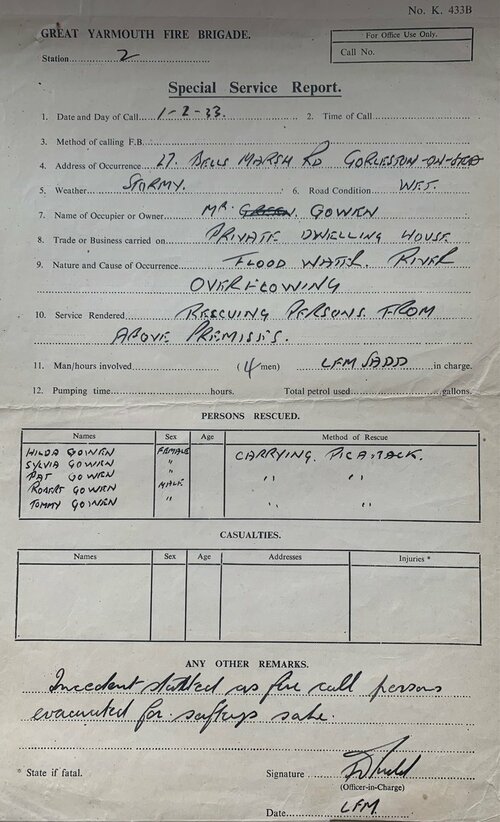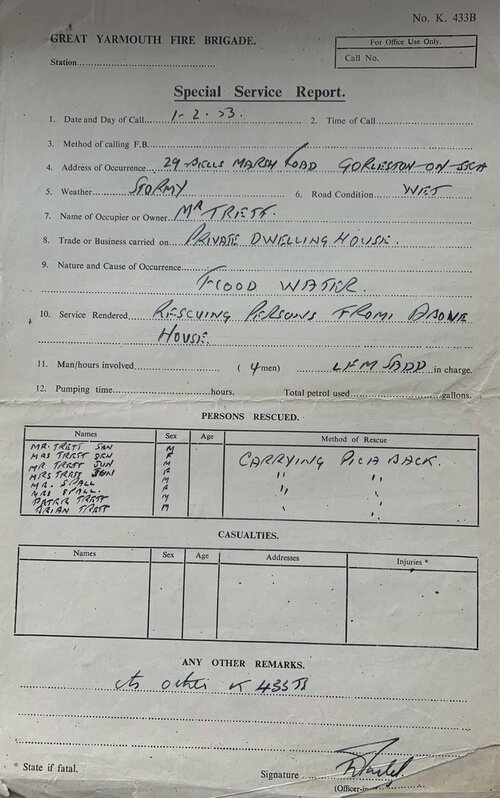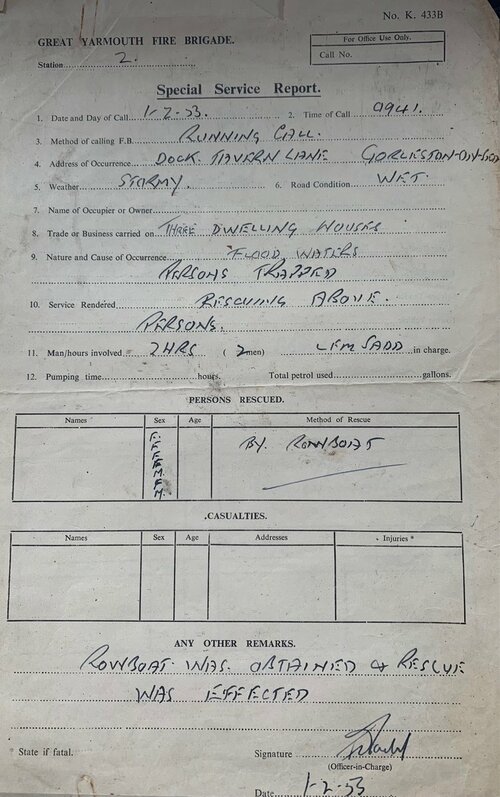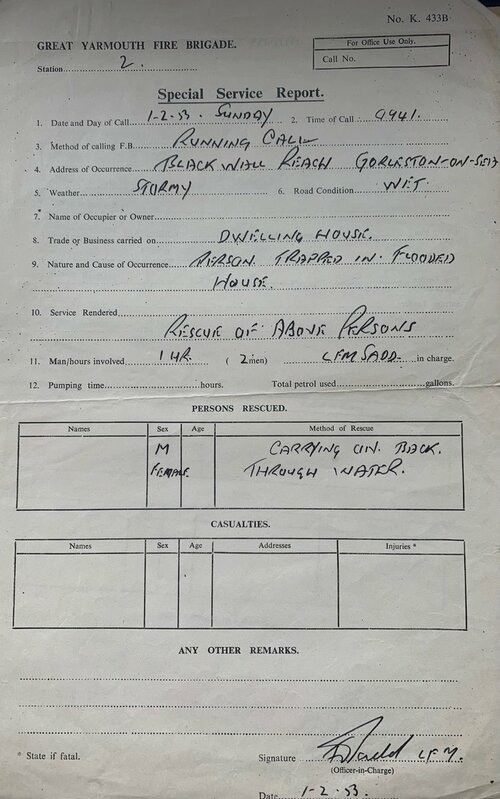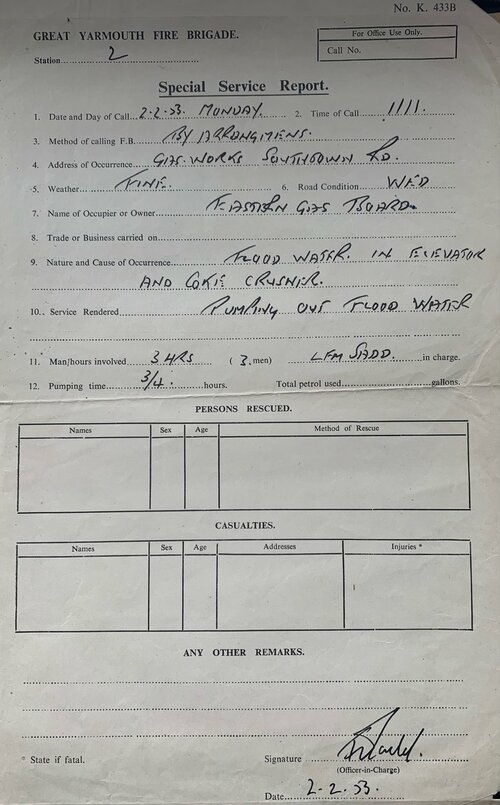Auction: 21003 - Orders, Decorations and Medals
Lot: 493
Sold by Order of a Direct Descendant
A few words from Brenda Sadd:
'As Fred Sadd's daughter-in-law, who I first met when I was in my teens, I learned a lot. He showed me how good fathers treated their children, an experience I never had in my own family.
Fred was a kind, quiet person but firm and fair and the most honest man I have ever met. He loved his football and played for his village Caister, as their goalkeeper for many years. At one time he played in the team at the same time as David (his brother-in-law) and his son Brian, much to his delight. He was a big man in every way, often known as "the gentle giant" to his friends. His actions in the floods of 1953 were so typical of him, the word hero is unfortunately very over used now, but he was one, a real one, and I hope he will be remembered as such.
The extremely rare 1953 'Great Yarmouth Floods' George Medal group of three awarded to Leading Fireman F. W. 'Fred' Sadd, Fire Service, for his remarkable gallantry in saving at least 25 lives during the worst flooding to hit these shores in the 20th Century
George Medal, E.II.R. (Frederick W. Sadd), with its Royal Mint case of issue; Defence Medal 1939-45; Fire Brigade L.S. & G.C., E.II.R. (Sub. Offr. Frederick W. Sadd), good very fine (3)
G.M. London Gazette 28 April 1953:
'Leading Fireman Sadd was in charge of a fire appliance which attended a fire call to Gorleston where a small estate of 16 prefabricated bungalows and some 30 two-storey houses was completely flooded to a depth of more than 5 feet. Sadd, seeing there were several people trapped in the bungalows and houses, and hearing their cries for help, instructed a fisherman to collect a boat and report back to him with it. Meanwhile, as something approaching panic was reigning in most of the flooded buildings, Leading Fireman Sadd, accompanied by two members of his crew, started to wade to the bungalows.
The water, however, soon proved to be too deep for his companions and Sadd, realising that they were unlikely to survive, ordered them back and continued alone. The level of the water was still rising, a very severe gale was blowing, it was pitch dark and the surface of the water was exceedingly rough. At times Sadd was completely submerged but he alternately waded and swam his way from house to house, reassuring the occupants and promising them that he would return with a boat to rescue them. He then made his way back to the high ground where the fisherman had returned with a boat. No oars were available but Sadd refused to abandon the attempt and by wading, and at times swimming, either pulling or pushing the boat in the direction it was desired to take, visited each of the bungalows, rescuing the persons found in them. In almost every case it was impossible to take the boat close up to the bungalows, and Sadd had therefore to carry each person in turn from bungalow to boat. The water was exceedingly cold and the conditions atrocious, but although suffering severely, Sadd persisted in his efforts.
After rescuing 5 adults and 5 children in this manner, Sadd collapsed, was given first aid treatment and sent back to his Station. A short while after, he responded to another call where, under similar conditions, he personally rescued a further 6 adults and 9 children from the houses on the estate. Throughout the entire proceedings, Leading Fireman Sadd showed courage of the highest order, with little or no regard for his own personal safety.'
Frederick William Sadd - or Fred to his friends and comrades - was born on 3 July 1909 at Great Yarmouth. By the outbreak of the Second World War, he was a Grocer's Assistant living with his wife in Caister-on-Sea, joining the Fire Service in August 1940. By the time of the 1953 Great Yarmouth Floods, he had completed some 13 years 3 months service, all of this full-time. The events of 31 January 1953 have gone down in history and the devastating flooding which overran Great Yarmouth were part of the greater North Sea Floods struck the Netherlands, north-west Belgium, England and Scotland. They were caused by the combination of wind, high tide, and low pressure caused the sea to flood land up to 5.6m above sea level. In Britain, they accounted for the worst flooding in the 20th Century.
As recalled by the Eastern Daily Press:
'Sea defences were swept aside by the wall of water which swept into King's Lynn at 6.30pm, had reached Hunstanton by 7pm and was powering towards Great Yarmouth by 9pm.
People noted a strange yellow tinge to the twilight, strong gusts of wind and a marked drop in temperature.
Out to sea a routine weather report from a ship near Iceland noted a drop in air pressure. It was plotted by forecasters at Britain's Meteorological office as a secondary depression which had broken away from a major low-pressure system in the Atlantic. But there was no suggestion that this would develop into the fiercest northerly gale ever recorded in Britain.
The winds began lashing Scotland – and the ever-deepening low-pressure system causing them spun off its predicted course and straight down the North Sea.
The winds pulled vast quantities of sea water southwards – a huge surge of water being forced down the narrowing funnel of the North Sea and on to the East coast of Britain.
Exactly 100 people were drowned, in Norfolk alone, that dreadful night. Thousands more spent a terrifying winter night, cowering on roofs, in trees, and on improvised rafts, soaked to the skin and lashed by salt-spray and hurricane-force winds. Tens of thousands more lost almost everything they owned and became homeless overnight.'
With flood defences breached, it was down to the bravery of everyday heroes like Sadd to show their mettle. He did this in spades, as elaborated upon in the Recommendation submitted on 17 February 1953, which gives further detail upon the final published citation.
It reveals his call to action came at 2210hrs on 31 January to Bells Marsh Road, where he effected the rescues in that place. Sadd threw himself into the icy water, sometimes wading and sometimes being fully submerged, all the time assuring the frightened families that he would come back to save their lives. When the row-boat they had been offered arrived, it was found that it had no oars and no bung in the escape-hole. Having plugged the hole, he took command and made the decision that he would propell the vessel by his wading and swimming, in spite of the strong waves and heavy winds that faced them. Having rescued 5 adults and 5 children, it is no surprise he collapsed at the scene exhausted.
Taken back to his Station for treatment, he took a shower and changed clothes. Most would have felt their duty was done, but Sadd then answered calls to the same location at 0325hrs on 1 February, saving the lives of a further 6 adults and 9 children. In the process, he suffered severe bruising to both legs, made in collisions with fences and other obstructions under the flood waters. He did not report these himself, these were noted by his companions on return to his Station. The following day, he also went to the Gasworks on Southdown Road in order to pump out flood water from the elevator and coke crusher
Always modest, as quoted in the press at the time, upon hearing he had been awarded the George Medal, Sadd said it was '...the second unbelievable thing to happen to me in the last few days. [The other] was I that I had been allotted a Cup Final ticket after trying for years and years.'
His own memories of the actions during that night:
'It all began quietly with a telephone call to the station that a prefab was on fire. I took a crew of three and an engine. Not until the engine suddenly hit the water dud we realise there was a flood. I fell out and found it was like a sea. All the street lighting had failed and there was a terrible wind.
...I started to wade across the flooded gardens. Suddenly I was nearly up to my neck with the soft ground giving under my feet. I could not see any fence tops, ditches or other obstactles until I blundered into them.'
Sadd went to London with his wife and son to receive the George Medal from the hands of The Queen at Buckingham Palace on 14 July, besides a Public Dinner at Great Yarmouth Town Hall, given by the Major Alderman Barfield on 14 May. He was also invited onto the Midland News on 29 April to talk about his actions and award, earning a fee of £2-2-0. Another touching moment for the family came when an anonymous Londoner sent a Ten Shilling note to him for his work, addressed to him at Bell's Marsh Road, the place of the rescues, with the simple message 'WITH BEST WISHES'. Sadd was latterly presented to The Duke of Edinburgh upon his visit to Great Yarmouth in December 1954, when The Duke showed a great interest in the gallantry displayed in earning the George Medal. His story was also featured in the comic Wham on 28 May 1966 and The Eagle in 1962. It is said he suffered leg cramps in later life, no doubt an effect of the prolonged immersion, besides sometimes calling out in his sleep, like he had done during those fateful days. The gallant Sadd died in June 1987.
Sold together with an impressive original archive, comprising:
(i)
A large album, filled with original and copied photographs, newspaper cuttings, telegrams, letters of congratulation and further details related to his award.
(ii)
His 5 Special Service Reports, Great Yarmouth Fire Brigade (No. K. 433B), each filled out with ink and detailing four rescues on 1 February 1953 and pumping work at Gasworks on 2 February 1953, a little worn.
(iii)
Ten Shilling note sent to Sadd, with postmark for London 3 April 1953, sent in thanks for his work by an anonymous Londoner.
(iv)
Copy of Wham, No. 102, 28 May 1966, featuring the acts of Sadd, torn in parts.
(v)
Copied Recommendation for Award.
(vi)
Wooden glazed frame for the Medals, made by his son, in which they have been kept for several years.
(vii)
Newpaper editions featuring mention and coverage of the events and of Sadd's actions. The most important perhaps by Steve Snelling for the Eastern Daily Press on the 50th Anniversary of the Floods in 2003.
Note: these Medals were originally loaned to the Great Yarmouth Fire Station in 1989 by his son for display and safe-keeping. By 2015, the Medals (without the original archive) were offered for Sale at Auction and were subsequently withdrawn. Having been returned to their rightful owners, we have the priveledge to offer them for Sale today.
Subject to 20% VAT on Buyer’s Premium. For more information please view Terms and Conditions for Buyers.
Sold for
£9,000
Starting price
£3800

